Table of Contents
Up until 2020, Indian students were already facing several hurdles when applying to universities abroad. Like the political situation in the US, high competition when applying to foreign universities, financing their education, etc. Then came COVID-19, entirely disrupting the idea to study abroad for Indian students. And the hurdles multiplied.
Now, when you’re choosing a university abroad, you have to consider a lot more factors than before. To find out what these elements are, we at iSchoolConnect administered a survey to 20,000+ students, asking them how they’re making their study abroad decisions.
And this is what they said-
Best country to study abroad for Indian students 2021
When asked “Which country is your dream study abroad destination?,” the majority said that the USA was the best country to study abroad for Indian students 2021.
43% identified the US as their top choice. Canada was next in line with 16% interest, followed by the UK with 12% and Germany with 10%.
Despite its ever-changing policy occurrences and political upheavals, the US is far more favored among Indian surveyees, thanks to its top-quality education, world-renowned degrees, and lucrative job markets.
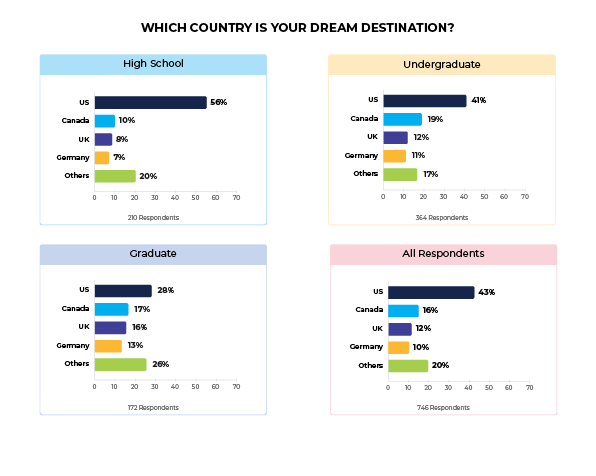
The country is followed after a large gap by Canada, UK, Germany, and Australia. Chosen as the best places to study abroad for Indian students, these destinations are home to high-ranking institutions at have lower costs and have made recent changes in their immigration policies.
Interestingly, despite the rising popularity of other higher education destinations, countries like Singapore, the Netherlands, etc. only accounted for 8% of the survey-takers.
Read more: Best Study Abroad Consultants in Noida
Major factors affecting the decision to study abroad for Indian students
There are a bunch of reasons why Indian students chose US, Canada, UK, and Germany as their favourite study destinations.
They all offer high-quality education, a degree from a university in these countries is recognized globally, and the best of these countries have friendly immigration policies.
But how important are these factors, really? And what else do students consider important? Let’s find out-
Quality education
67% of Indian high school survey-takers told us that they consider the ‘Quality of Education’ as one of the top deciding factors while choosing a university.
Similarly, 62% of students who plan on applying for their masters overseas cited it as one of the most prominent factors in their decision.
Another common factor chosen by students was the ‘Value of education.’ Considering that studying abroad opens doors across all major organizations and countries, this wasn’t very surprising.
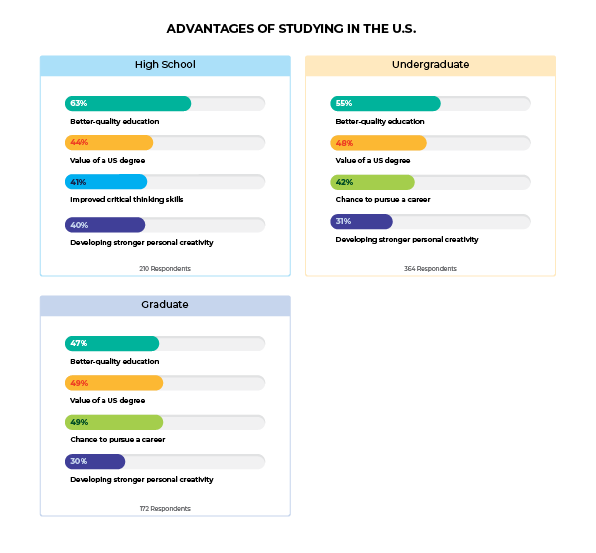
Global exposure
According to our study abroad statistics, 42% of undergraduate and 49% of graduate survey-takers said that one of the primary reasons they chose to study in the US was because it offered them the opportunity to pursue a career.
This doesn’t necessarily mean that your peers want to stay back permanently and work abroad. They simply want to gain considerable experience working at a global level.
Cost of education
The number one concern of Indian students when it comes to studying abroad is how to balance the cost vs the value of education.
Over 45% of the survey-takers expressed their concerns on the ROI when it came to their education spend.
This goes to show that most students choose to go to institutions that have well-endowed funding sources and offer helpful career guidance services.
Getting a visa
According to our study abroad statistics, about 40% of students across all study levels – be it high school or bachelors or masters – said that they would be more amenable to choosing higher education institutions abroad if they had more accessible visa services in India.
This has become an even more important element to consider. Embassies worldwide are operating on a need-only basis with a limited amount of interview slots available as COVID spreads across the country.
Safety from COVID-19
More than 46% of the Indian surveyees indicated that they would be more amenable to studying abroad if they received COVID-vaccines as added precautions.
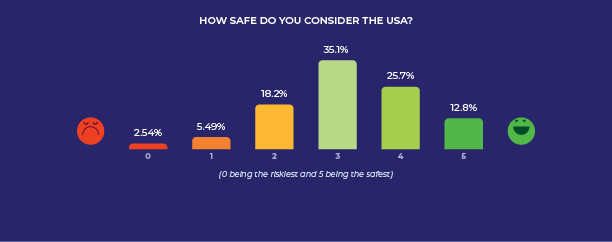
On the other end of the spectrum, while some universities are conducting vaccination drives for students, most are making it compulsory for students to be vaccinated before joining classes.
3 important points students ignore when shortlisting colleges
Yes, factors like the ‘Quality of education,’ ‘Tuition fee,’ and ‘Visa assistance are important when it comes to choosing a university abroad.
But we found out that students, especially Indian students, underestimate the role of 3 vital details.
These points have slowly started gaining students’ attention and are already becoming an important part of their higher-ed decisions.
Graduate success
When asked what would make them choose a particular university, our Indian surveyees referred to the experiences and successes of the graduate students in those institutions.
46% of high school respondents and 43% of undergrads claimed that ‘Personal (or virtual) conversations with Indian graduates from the institution’ would convince them, 43% high schoolers and 45% undergraduate students said that they would look out for ‘Personal (or virtual) conversations with current Indian students at the institution.’ Their third best choice was ‘Video testimonials from past Indian graduates from the institution.’
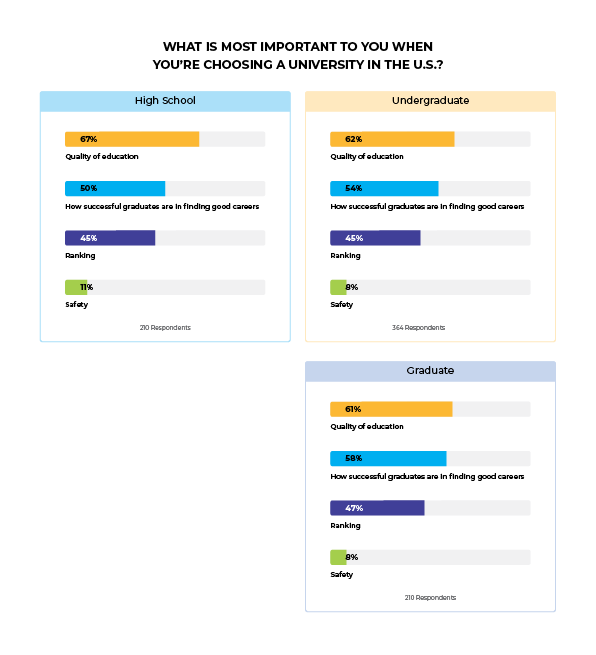
This will not only help you understand the academic and the job environment but also give you a good idea of the culture, the people, and the teachers are the university.
Without speaking to these students (or experienced consultants), you will find it very difficult to get accurate and trustworthy information about the university.
The role of parents
COVID-19 has further highlighted that when it comes to Indian students, parents are key influencers in their study abroad decisions.
According to the survey, in 31% of cases, it is Parents who take the final call. And given that they’re the ones sponsoring our education and have quite a lot of experience handling finances, it makes sense for us to consult our parents.
Consequently, students are inclined towards institutions that have a parent-inclusive approach.
These, along with a few other factors stated in the survey, play an important role in affecting Indian students’ plans around their higher education.
Right guidance
Perhaps one of the most underrated and least discussed factors, student guidance is the underlying role-player in Indian students’ higher education decisions.
Your peers who took the survey believe that it plays a vital role every step of the way. And yet is not as looked after as it should be.
Only 71% of respondents said that education consultants provide them with ‘very helpful’ or ‘somewhat helpful guidance,’ while 28% found their consultants not (or very less) helpful.
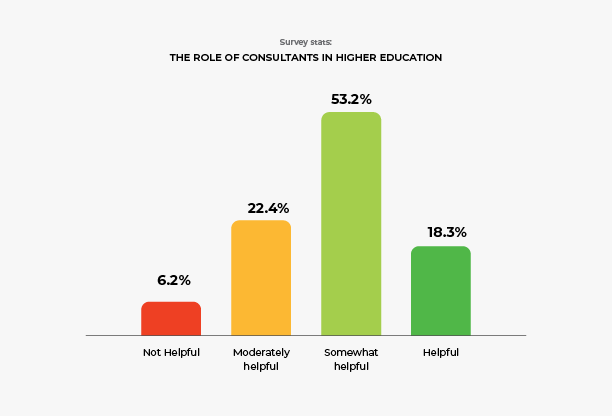
What’s more, right guidance is required not only before you start studying at a university but also after.
Students taking the survey said that they expect universities to offer better academic, career, and health support services, making academic and future guidance two of the most important reasons behind them choosing a particular university.
How to decide which university is best for you?
There is no right answer to this question because it depends on a lot of factors-
- First, you need to figure out which course you’re pursuing
- Next, see which universities offer the best programs in your field
- Filter them out by using the factors we’ve shared in this blog
- Consider other points that matter, like eligibility, academics, cost of studying, job opportunities, etc.
- Make sure that the current immigration policies of the country you want to go to align with your career plans
Once you’re through these steps, you will know exactly which universities are best for you.
And if you get stuck at any point or have any more questions, feel free to drop a comment or reach out to us! We’d be more than happy to help.
In the meanwhile, we wish you all the best with your dream of studying abroad!






